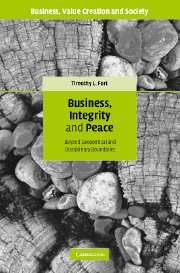5 - Hard Trust
Published online by Cambridge University Press: 19 January 2010
Summary
In Part One, I suggested that there were three contributions business could make to sustainable peace in a Track Two fashion. Peace Through Commerce comes through corporations fostering economic development, submitting to external evaluations of their actions (rule of law kinds of issues), and building of affective dimensions of community. Those dimensions do not come out of thin air. They come from values deeply rooted in our biological and even pre-biological nature: economizing, power-aggrandizing, and ecologizing. They also extrude into business life in a different way. Each represents an approach to defining corporate responsibility. From schools of management, one finds normative and strategic arguments for how ethics can be integrated into business. From law schools and legal scholarship, one finds constraints to rein in egregious behavior. From aesthetic and spiritual perspectives, one finds challenges for connecting moral excellence and personal meaning in work. Unfortunately, these three approaches to business ethics rarely interact with each other. Not only is the twenty-first century a time and season for business to contribute to sustainable peace, it is also a time and season for these approaches to be integrated. Part Two of this book suggests that integrity is indeed a metaphor for the twenty-first century for four reasons.
First, as its root suggests, integrity is a holistic concept and so integrating various approaches to business ethics is a way to build upon strengths of each of the approaches.
- Type
- Chapter
- Information
- Business, Integrity, and PeaceBeyond Geopolitical and Disciplinary Boundaries, pp. 131 - 164Publisher: Cambridge University PressPrint publication year: 2007

